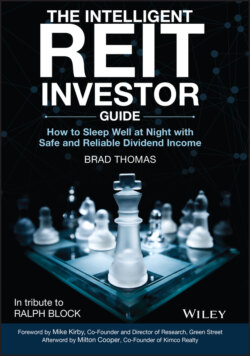Читать книгу The Intelligent REIT Investor Guide - Brad Thomas - Страница 25
Direct Ownership
ОглавлениеAs we've mentioned before and will continue to explore, real estate has historically behaved differently from other assets. It therefore adds another dimension of diversity to stock, bond, cash, and even gold and art investments.
REITs are hardly the only way to take advantage of these factors though. Plenty of people choose direct ownership, for example, by being in the real estate business. In which case, they (hopefully) asked themselves questions like: Do I have the time to manage property? Do I know the best time to buy or sell? Do I have or can I obtain the insider information necessary to make it worth my while? Can I attract and retain the best tenants?
Depending on the market climate, buying real estate on the cheap to sell “on the expensive” is often more profitable than holding and managing it. That's why flipping houses holds such an appeal.
Then again, there's a reason why people can lose just as much as they can make on such ventures. Judging the markets appropriately, not to mention the costs and efforts involved, requires access to constantly evolving data. As for buying and holding to rent out to others, this necessitates effective and efficient property management. These cautions can't be overstated, especially since individuals often lack the time, money, and/or expertise to handle those tasks on their own.
It might seem intensely more profitable to keep all the profits from real estate instead of sharing it with fellow investors. But it's also riskier. Investment value is very often determined by the local economy. Therefore, at any given time, commercial properties may be doing well in one place and poorly in another. And most individuals simply don't have the financial resources to buy up a portfolio big enough to be safely diversified, either by property type or geography.
There's the problem of liquidity as well. Selling a single piece of real property can be very time‐consuming and even costly. It's not a simple matter of determining to sell and pressing a button. Far from it. And maintenance and security make for even more headaches. Most people don't want to be the one taking calls about break‐ins, clogged pipes, and stuck elevators. Yet using an outside management company can significantly reduce their profits.
Some investors claim they don't need to own either rental properties or REITs since they own their own homes. However, the dynamics of home values are often very different from those of commercial real estate – something we'll discuss again, albeit briefly, in Chapter 4. For starters, the same diversification and liquidity issues just described factor into owning just one home, as does emotional attachment. It's true that equity can be pulled out of one's home by refinancing, but that usually requires a tradeoff of substantially higher monthly mortgage payments.
So, simply stated, home ownership is no substitute for owning commercial real estate. That's why, for most individual investors, gaining access to real estate through professional rather than personal means is a far wiser course of action.
